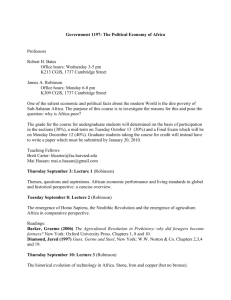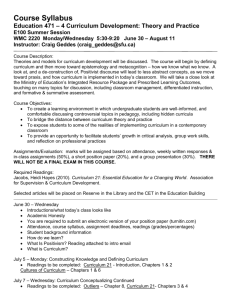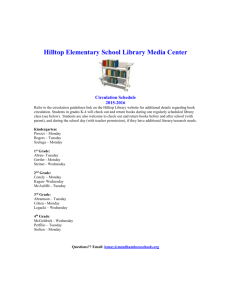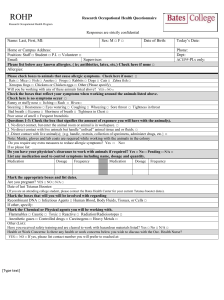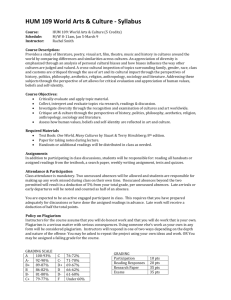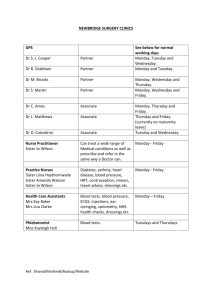Government 1197: The Political Economy of Africa Location: CGIS
advertisement
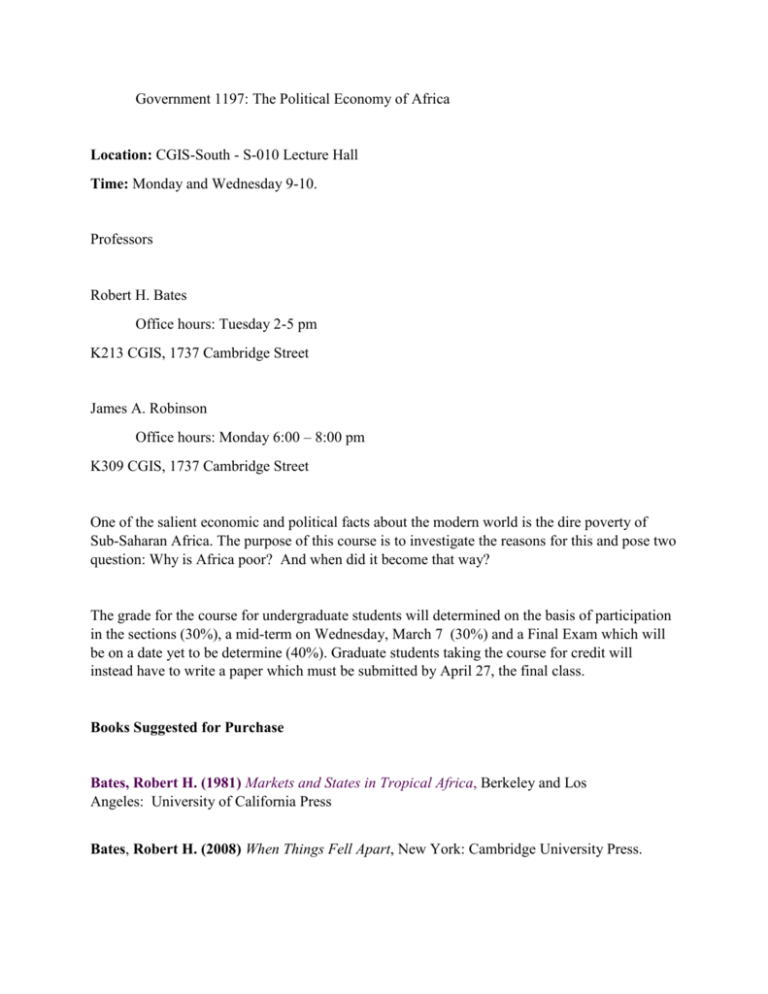
Government 1197: The Political Economy of Africa Location: CGIS-South - S-010 Lecture Hall Time: Monday and Wednesday 9-10. Professors Robert H. Bates Office hours: Tuesday 2-5 pm K213 CGIS, 1737 Cambridge Street James A. Robinson Office hours: Monday 6:00 – 8:00 pm K309 CGIS, 1737 Cambridge Street One of the salient economic and political facts about the modern world is the dire poverty of Sub-Saharan Africa. The purpose of this course is to investigate the reasons for this and pose two question: Why is Africa poor? And when did it become that way? The grade for the course for undergraduate students will determined on the basis of participation in the sections (30%), a mid-term on Wednesday, March 7 (30%) and a Final Exam which will be on a date yet to be determine (40%). Graduate students taking the course for credit will instead have to write a paper which must be submitted by April 27, the final class. Books Suggested for Purchase Bates, Robert H. (1981) Markets and States in Tropical Africa, Berkeley and Los Angeles: University of California Press Bates, Robert H. (2008) When Things Fell Apart, New York: Cambridge University Press. Vansina, Jan (2004) Antecedents to Modern Rwanda, Madison: University of Wisconsin Press. Bates, Robert H. (1987) Essays on the Political Economy of Rural Africa. Berkeley and Los Angeles: University of California Press Teaching Fellows Brett Carter: blcarter@fas.harvard.edu Mai Hassan: mai.o.hassan@gmail.com Monday, January 24: Lecture 1 (Robinson) Themes, questions and aspirations. African economic performance and living standards in global and historical perspective: a concise overview. Wednesday, January 26: No Lecture Monday, January 31: Lecture 2 (Robinson) The Neolithic Revolution and the historical evolution of technology in Africa. Stone, Iron and copper (but no bronze). Africa 2000 years ago in comparative perspective. When did Africa fall behind? Readings: Barker, Graeme (2006) The Agricultural Revolution in Prehistory: why did foragers become farmers? New York: Oxford University Press. Chapter 1. Diamond, Jared (1997) Guns, Germs and Steel, New York: W.W. Norton & Co. Chapter 4 pp. 85-92. Douglas, Mary (1962) “Lele Economy compared to the Bushong,” in Paul Bohannan and George Dalton eds. Markets in Africa, Evanston: Northwestern University Press. Vansina, Jan (1978) The Children of Woot: A History of the Kuba Peoples, Madison: University of Wisconsin Press. Chapter 5. Wednesday, February 2: Lecture 3 (Robinson) Development of states and political complexity #1: Some basic models and issues. McIntosh, Susan K. (1999) “Pathways to Complexity: An African Perspective,” In Beyond Chiefdoms: Pathways to Complexity in Africa, S.K. McIntosh, ed. Cambridge University Press: 1–30. Goody, Jack (1971) Technology, Tradition and the State in Africa, New York; Cambridge University Press. Chapters 1 and 2. Monday, February 7: Lecture 4 (Bates) Stateless societies Readings: Bates, Robert H. (1987) Essays on the Political Economy of Rural Africa. Berkeley and Los Angeles: University of California Press, chapter 1 Wednesday, February 9: Lecture 5 (Bates) Societies with states: Some reasoning and an example Bates, Robert H. (1987) Essays on the Political Economy of Rural Africa. Berkeley and Los Angeles: University of California Press, chapter 2 Levtzion, Nehemia. (1980) Ancient Ghana and Mali, London, Africana Publishing Company, chapters 5-8. Gomez, Michael A. (1990) “Timbuktu Under Imperial Songhay,” The Journal of African History, 31(1): 5-24. http://www.jstor.org.ezp-prod1.hul.harvard.edu/stable/pdfplus/182798.pdf Monday, February 14: Lecture 6 (Bates) Patterns of trade in pre-modern Africa Readings: Hopkins, Anthony G. (1973) An Economic History of West Africa, New York: Addison Wesley Longman. Chapter 2, pp. 8-77. Ottenberg, Simon and Phoebe Ottenberg (1962) “Afikpo Markets: 1900-1960,” in Paul Bohannan and George Dalton eds. Markets in Africa, Evanston: Northwestern University Press. Cohen, Abner (1969) Custom and Politics in an Urban African Community, Berkeley and Los Angeles, University of California Press., pp. 72-92. Leeson, Peter (2007) “Trading with Bandits,” Journal of Law and Economics, 50(May): 303321. http://www.journals.uchicago.edu.ezp-prod1.hul.harvard.edu/doi/pdf/10.1086/511320 Wednesday, February 16: Lecture 7 (Bates) Development of states and political complexity #3: Eastern Africa Vansina, Jan (2004) Antecedents to Modern Rwanda, Madison: University of Wisconsin Press. Read Chapters 1-3. Bates, R. H. (1987) The Centralization of African Societies. Essays on the Political Economy of Rural Africa. Berkeley and Los Angeles: University of California Press. Pp. 1-58. Monday, February 21: President’s Day (No Class) Wednesday, February 23: Lecture 8 (Robinson) The Demographic Factor and the impact of slavery and the slave trade Hopkins, Anthony G. (1973) An Economic History of West Africa, New York: Addison Wesley Longman. Chapter 2, pp. 8-77. Brenner, Robert (1976) “Agrarian Class Structure and Economic Development in Pre-industrial Europe,” Past and Present, 70, 30-75. http://www.jstor.org.ezp-prod1.hul.harvard.edu/stable/pdfplus/650345.pdf Nunn, Nathan (2008) “The Long Term Effects of Africa’s Slave Trades,” Quarterly Journal of Economics, 123, 139-176. http://www.mitpressjournals.org.ezp-prod1.hul.harvard.edu/doi/pdf/10.1162/qjec.2008.123.1.139 Lovejoy, Paul E. (1989) “The Impact of the Atlantic Slave Trade on Africa: A Review of the Literature.” Journal of African History 30, 365-394. http://www.jstor.org.ezp-prod1.hul.harvard.edu/stable/pdfplus/182914.pdf Monday, February 28: Lecture 9 (Robinson) State institutions and the economic success of Botswana. Readings: Parsons, Q. Neil (1977) “An Economic History of King Khama’s Country,” in Robin Palmer and Q. Neil Parsons eds. (1977) The Roots of Rural Poverty in Central and Southern Africa, London: Heinemann Educational. Robinson, James A. (2008) “Botswana as a Role Model for Country Success,” WIDER Working Paper 2009/40. http://www.wider.unu.edu/publications/working-papers/research-papers/2009/en_GB/rp200940/_files/81579363566683606/default/RP2009-40.pdf Wednesday, March 2: Mid-Term Examination Monday, March 7: Lecture 10 (Bates) Settlers and Traders Readings: Bates, R. H. (1987) Essays on the Political Economy of Rural Africa. Berkeley and Los Angeles: University of California Press. Chapter 3. O’Dike, K. (1982) Trade and Politics in the Niger Delta, 1830-55. Oxford: Greenwood Press. Chapters 1, 5-9, and 11. Wednesday, March 9: Lecture 11 (Robinson) Creation of colonial economies Readings: Hopkins, Anthony G. (1973) An Economic History of West Africa, New York: Addison Wesley Longman. Chapter 4. Dalton, George H. (1965) “History, Politics and Economic Development in Liberia,” Journal of Economic History, 25, 569-591. http://www.jstor.org.ezp-prod1.hul.harvard.edu/stable/pdfplus/2116129.pdf Feinstein, Charles H. (2005) An Economic History of South Africa: Conquest, Discrimination and Development, New York; Cambridge University Press. Chapters 2, 3 and 4. Monday, March 21: Lecture 12 (Bates) African Economic Growth since Independence Readings: Benno Ndulu and Stephen A. O’Connell (2007) “Policy Plus: Africa’s Growth Performance, 1960-2000,” in Benno Ndulu et al., The Political Economy of Economic Growth in Africa, 19602000: An Analytic Survey, Cambridge: Cambridge University Press, pp. 3-75. Collier, Paul and Stephen A. O’Connell (2007) “Opportunities and Choices,” in Benno Ndulu et al., The Political Economy of Economic Growth in Africa, 1960-2000: An Analytic Survey, Cambridge: Cambridge University Press, pp. 76-136. Wednesday, March 23: Lecture 13 (Bates) The political economy of decline Readings: Bates, Robert H. (1981) Markets and States in Tropical Africa, Berkeley: University of California Press. Monday, March 28: Lecture 14 (Robinson) The Failure of Industrialization in Africa: The case of Ghana Readings: Killick, Tony (1978) Development Economics in Action, London: Heinemann. Chapter 2 “Development, Disequilibrium and State Interventionism”, Chapter 3 “The Economic Strategies of Nkrumah and his Successors,” pp. 11-65, and Chapter 9 “The State as Entrepreneur” pp. 214262. Wednesday, March 30: Lecture 15 (Bates) Political Reform Reading: Bates, Robert H. (2007) “Political Reform,” in Benno Ndulu et al., The Political Economy of Economic Growth in Africa, 1960-2000: An Analytic Survey, Cambridge: Cambridge University Press, pp. 348-390. Monday, April 4: Lecture 16 (Bates) State Failure, Violence and Civil War Reading: Bates, Robert H. (2008) When Things Fell Apart, New York: Cambridge University Press. Wednesday, April 6: Lecture 17 (Robinson) Economic Legacies of Colonialism Acemoglu, Daron, Simon Johnson and James A. Robinson (2001) “The Colonial Origins of Comparative Development: An Empirical Investigation,” American Economic Review, 91, 13691401. Moradi, Alexander (2008) “Confronting Colonial Legacies - Lessons from Human Development in Ghana and Kenya,” Journal of International Development, 20, 1107-1121, 2008 Richens, Peter (2009) “Economic Legacies of the ‘Thin White Line’ http://eprints.lse.ac.uk/27879/ Monday, April 11: Lecture 18 (Bates) Ethnicity Readings: Miguel, Edward (2004) “Tribe or Nation? Nation Building and Public Goods in Kenya versus Tanzania,” World Politics, 56 (3), 327-362. http://muse.jhu.edu.ezp-prod1.hul.harvard.edu/journals/world_politics/v056/56.3miguel.pdf Habyarimana, James, Macartan Humphreys, Daniel Posner and Jeremy Weinstein (2007) “Why Does Ethnic Diversity Undermine Public Good Provision?” American Political Science Review, 101 (4), 709-725. http://proquest.umi.com.ezpprod1.hul.harvard.edu/pqdlink?index=17&did=1393374611&SrchMode=3&sid=2&Fmt=6&VIn st=PROD&VType=PQD&RQT=309&VName=PQD&TS=1251907699&clientId=18857&aid=1 Bates, Robert H. and Irene Yackolev (2002) “Ethnicity in Africa,” In Christiaan Grootaert and Thierry van Bastelaer, eds. The Role of Social Capital in Development: An Empirical Assessment, New York: Cambridge University Press. Wednesday, April 13: Lecture 19 (Robinson) Economic decline, civil war and international aid in Sierra Leone. Readings: Keen, David (2005) Conflict and Collusion in Sierra Leone, Oxford: James Currey. Chapter 2. Robinson, James A. (2008) “Governance and Political Economy Constraints to World Bank CAS Priorities in Sierra Leone,” http://www.people.fas.harvard.edu/~jrobins/researchpapers/unpublishedpapers/index.htm Monday, April 18: Lecture 20 (Carter) How to run a dictatorship. Wednesday, April 20: Lecture 21: (Bates) Recent economic growth Reading: Economic Commission for Africa, Annual Report 2004 and 2009, http://www.uneca.org/era2008/ Monday, April 25: Lecture 22 (Bates and Robinson) Understanding African Poverty over the Longue Durée. Readings: Acemoglu, Daron and James A. Robinson (2010) “Why is Africa Poor?” Economic History of Developing Regions, 25, 21-50. Sachs, Jeffrey D. and Andrew M. Warner (1997) “Sources of Slow Growth in African Economies,” Journal of African Economies, 6(3), 335-76. http://jae.oxfordjournals.org.ezp-prod1.hul.harvard.edu/cgi/reprint/6/3/335 Weil, David N. Quamrul Ashraf and Ashley Lester (2008) “When Does Improving Health Raise GDP?” NBER Macroeconomics Annual 2008, 3. http://www.nber.org/papers/w14449.pdf Wednesday, April 27: No Lecture.
